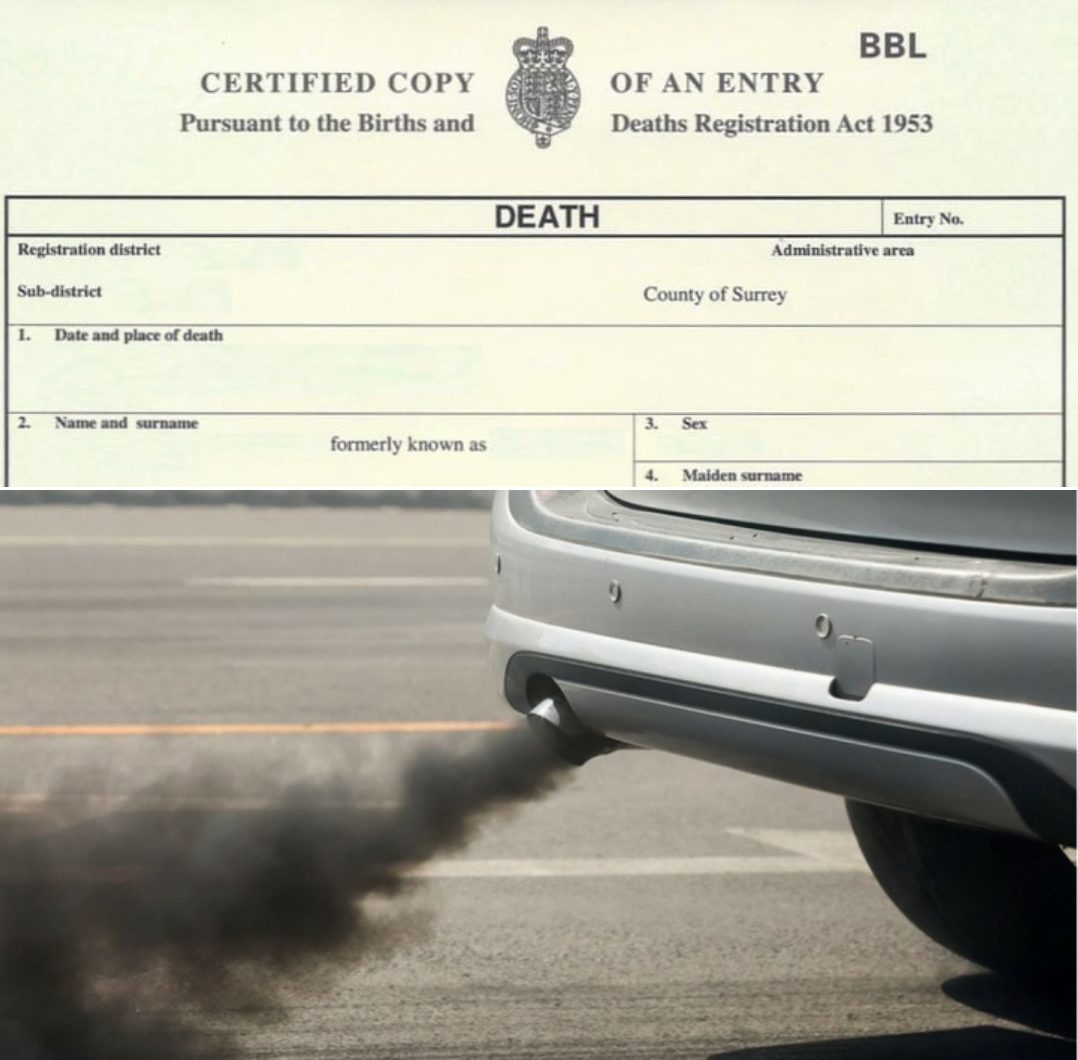The transport sector is one of the largest contributors to greenhouse gas emissions globally. In the UK, vehicles powered by fossil fuels ie petrol and diesel, are a major driver of environmental degradation, contributing to air pollution, global warming, and the destruction of ecosystems. This dependency on fossil fuels is killing the environment, despite global and national efforts to combat climate change. At the same time, the transition to electric vehicles (EVs), which are seen as a cleaner alternative, is facing significant challenges, with sales stalling in recent months.
The UK’s automotive industry has issued warnings about the sustainability of this transition, citing the economic strain and insufficient consumer demand. With climate-linked sales targets approaching, and penalties looming for manufacturers that fail to meet them, the future of the UK’s electric vehicle market remains uncertain.
Fossil Fuel-Powered Vehicles and Their Impact on the Environment
Fossil fuel-powered vehicles emit significant amounts of carbon dioxide (CO₂) and other harmful pollutants such as nitrogen oxides (NOx) and particulate matter (PM), which contribute to air pollution and climate change. According to the UK’s Department for Transport, road transport accounts for 27% of the country’s total greenhouse gas emissions, making it the largest contributor to pollution in the UK. These emissions have serious consequences for both the environment and public health.
Air Pollution and Health Impacts
One of the immediate effects of vehicle emissions is air pollution, particularly in urban areas. The NOx and PM emitted from petrol and diesel vehicles are major contributors to respiratory illnesses, cardiovascular diseases, and premature deaths. A report from the Royal College of Physicians estimated that air pollution is responsible for around 40,000 premature deaths annually in the UK. The pollutants also contribute to the formation of ground-level ozone, which can cause further respiratory problems and reduce agricultural productivity.
Climate Change and Global Warming
The burning of fossil fuels releases CO₂, a potent greenhouse gas, into the atmosphere. This gas traps heat, contributing to the warming of the planet. In the UK, road transport is responsible for around 91% of all transport-related emissions, and the majority of these emissions come from private vehicles. Climate scientists have warned that if emissions from fossil fuel vehicles are not drastically reduced, the UK will struggle to meet its climate targets under the Paris Agreement, which aims to limit global temperature rise to 1.5°C above pre-industrial levels.
The environmental damage caused by fossil fuel vehicles extends beyond air pollution and climate change. The extraction, refining, and transportation of fossil fuels also lead to habitat destruction, water pollution, and the depletion of natural resources. Moreover, oil spills, such as those that occur during drilling or transportation, can have catastrophic effects on marine and coastal ecosystems.
Noise Pollution
In addition to the visible and measurable emissions, fossil fuel-powered vehicles are also a major source of noise pollution, especially in densely populated urban areas. Constant exposure to high levels of noise can lead to stress, sleep disturbances, and cardiovascular issues. Electric vehicles, in contrast, are much quieter, offering an additional environmental benefit.
The Role of Electric Vehicles in Reducing Environmental Impact
Electric vehicles are often promoted as a key solution to reducing emissions from the transport sector. Powered by electricity, they emit zero tailpipe emissions, making them a cleaner alternative to petrol and diesel vehicles. The UK government has set ambitious targets to phase out the sale of new petrol and diesel cars by 2030 and achieve 100% zero-emission vehicle sales by 2035. However, the transition is proving to be more challenging than initially anticipated.
The Promise of EVs: Cleaner Air and Reduced Greenhouse Gases
EVs produce no tailpipe emissions, which means they do not emit CO₂, NOx, or PM directly into the atmosphere. If powered by renewable energy sources such as wind, solar, or hydropower, their lifecycle emissions can be significantly lower than those of fossil fuel vehicles. In addition, the wider adoption of EVs can reduce the demand for oil, helping to lower the environmental impact of fossil fuel extraction and processing.
In the UK, where the power grid is becoming increasingly reliant on renewable energy, the environmental benefits of switching to EVs are even more pronounced. The shift to electric vehicles has the potential to significantly reduce the UK’s overall carbon footprint, improve air quality, and mitigate the impacts of climate change.
The Stagnation of EV Sales and Industry Challenges
Despite the environmental benefits of EVs, the transition has hit a roadblock. The Society of Motor Manufacturers and Traders (SMMT) recently raised concerns about the slow growth in EV sales, which have stalled below 18%. This is worrying given that the UK government has mandated that 22% of new cars sold in 2024 must be zero-emission vehicles, with this figure rising to 80% by 2030 and 100% by 2035. Manufacturers that fail to meet these targets face hefty fines of £15,000 per non-zero-emission vehicle sold.
Economic Barriers and the Cost to the Industry
The automotive industry has warned that its efforts to support the transition to electric vehicles cannot be sustained indefinitely. In an open letter to Chancellor Rachel Reeves, the SMMT stated that while the industry is “committed to net zero,” it is shouldering the bulk of the costs. This comes at a time when demand for new cars is at a record low due to economic uncertainty, high inflation, and the cost-of-living crisis. The SMMT estimated that price cuts on electric vehicles, aimed at boosting sales, could total £2 billion by the end of the year. However, these price reductions have only had a limited impact on consumer demand.
Manufacturers have already invested billions into the development of EVs and the necessary infrastructure, but the return on investment has been slow. Without stronger government support, including incentives for consumers, the industry fears that it will not be able to meet the government’s ambitious sales targets. The SMMT has called for measures such as reducing VAT on new EVs and lowering the tax on non-domestic battery charging to help drive sales.
Consumer Concerns: Affordability and Infrastructure
One of the key reasons for the stagnation in EV sales is consumer scepticism. Despite the environmental benefits, many drivers remain hesitant to switch to electric vehicles due to concerns about price, range, and the availability of charging points. Electric vehicles are still more expensive upfront than their petrol or diesel counterparts, and while running costs are lower, the initial purchase price remains a significant barrier for many consumers.
Affordability has become even more of an issue in the current economic climate, where living standards are being squeezed by inflation and high energy costs. According to the SMMT, much of the recent growth in EV sales has been driven by fleets rather than individual consumers. This suggests that private buyers are still reluctant to make the switch, despite the availability of discounts and incentives.
Vehicle range and charging infrastructure are also significant concerns for consumers. While battery technology has improved, many EVs still cannot match the range of petrol or diesel cars, leading to ‘range anxiety’. The UK government has invested in expanding the public charging network, but drivers still report that the availability of charging points is inconsistent, particularly in rural areas. Without a robust and accessible charging infrastructure, many consumers are unlikely to consider switching to an EV.
Government Support and Economic Constraints
The UK government has expressed its commitment to supporting the transition to electric vehicles, but budgetary constraints are limiting the scope of available incentives. Labour’s Rachel Reeves has warned of tough choices in the upcoming budget, as the country grapples with a reported ‘£22bn deficit’. While the government recognises the importance of a thriving automotive industry and the environmental benefits of EVs, it states that it is under pressure to ‘balance the books’.
The SMMT has argued that government support is essential to drive consumer demand for EVs and achieve the country’s climate goals. Without additional incentives, such as a reduction in VAT on new EVs or further investment in charging infrastructure, the transition to electric vehicles risks stalling further. This could have serious consequences not only for the environment but also for the UK’s automotive industry, which relies on sustained growth and investment.
The Path Forward: Balancing Environmental and Economic Goals
The transition to electric vehicles is critical to achieving the UK’s climate targets and reducing the environmental impact of road transport. However, as the stagnation in EV sales shows, this transition is fraught with challenges. The automotive industry is calling for greater government support, while consumers remain hesitant due to concerns about cost, range, and charging infrastructure.
To overcome these challenges, a more coordinated approach is needed. The government must continue to invest in public charging infrastructure and provide incentives to make electric vehicles more affordable. At the same time, manufacturers must continue to innovate, producing more affordable and efficient EVs to meet the demands of a sceptical public.
The environmental benefits of electric vehicles are clear, but the transition must be managed carefully to ensure that it is economically sustainable. Without stronger consumer support and continued investment, the UK risks missing its climate targets and jeopardising the future of its automotive industry.
Fossil fuel-powered vehicles are one of the greatest threats to the environment, health, contributing to air pollution, climate change, and resource depletion. The transition to electric vehicles offers a solution, but this transition is currently faltering. The UK government and the automotive industry must work together to address the barriers to EV adoption, including affordability, infrastructure, and consumer confidence. Only by tackling these challenges head-on can the UK reduce its reliance on fossil fuels to protect the environment for future generations and help reduce death by petrol and diesel fueled vehicles.
KEEP US ALIVE and join us in helping to bring reality and decency back by SUBSCRIBING to our Youtube channel: https://www.youtube.com/channel/UCQ1Ll1ylCg8U19AhNl-NoTg AND SUPPORTING US where you can: Award Winning Independent Citizen Media Needs Your Help. PLEASE SUPPORT US FOR JUST £2 A MONTH https://dorseteye.com/donate/












